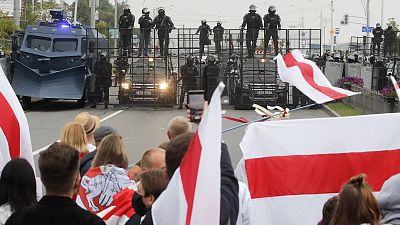Belarus: Dozens arrested at protests as Lukashenko changes tactics to quell unrest

Police in Belarus detained over 50 people across the country as protests demanding the resignation of the country’s authoritarian leader entered their third week, officials said on Wednesday.The renewed crackdown on protesters, who have been taking to the streets for more than two weeks, comes as authorities crank up the pressure on the opposition, jailing several activists, summoning others for questioning and selectively ordering dozens of demonstrators to appear in court.
The Belarusian Interior Ministry said 51 protesters were detained on Tuesday at rallies that spanned several cities. According to the Viasna human rights group, 15 people were detained in Minsk, the country’s capital, where several thousand people rallied at Independence Square despite heavy rain, pushing for the country’s longtime President Alexander Lukashenko to resign.
Two members of the Coordination Council, an opposition body set up by former presidential candidate Sviatlana Tsikhanouskaya to facilitate a peaceful transition of power, were also handed 10-day jail sentences.
The detentions come without the dramatic violence seen two weeks ago, as Lukashenko moves to quell the unrest gradually, with vague promises of reforms mixed with threats, court summonses and selective arrests.
Observers say the moves by Lukashenko to buy some time likely will see him holding onto power for now, although he almost certainly will face more challenges amid a worsening economy and simmering public anger.
“All the signs are now that this is a war of attrition. That Lukashenka counts on wearing down the population now,” Dr Nigel Gould-Davies, a senior fellow at the International Institute for Strategic Studies, told Euronews.
“We can no longer speak just of the opposition. This is most of the country united in a peaceful demand for change.”
In terms of regime tactics to bring a conclusion to the unrest, Gould-Davies believes Lukashenko will now try a different tack to the heavy-handed measures already seen on the streets of Belarus.
“It will involve low-level harassment, hoping that exhaustion and economic hardship, in particular, might encourage the striking workers to go back to the factories and abandon the movement for change,” he said.
“I don’t actually see that happening any time soon. Conversely, the movement for change will be looking for cracks in the regime, for members of the elite to realise that loyalty lies with the future of the country rather than this discredited, authoritarian leader,” he added.
The brutal suppression of peaceful rallies in the immediate aftermath of the election fuelled public anger, helping swell the number of protesters, reaching an unprecedented peak of about 200,000 participants on two consecutive Sundays.
Police used tear gas, flash grenades and beatings on crowds in the capital of Minsk and elsewhere. In the days following the August 9 election, security forces detained thousands, with hundreds injured and at least three deaths.
The huge crowds at subsequent protests have forced the government to back off and allow the demonstrations to take place largely unhindered for the past two weeks.
